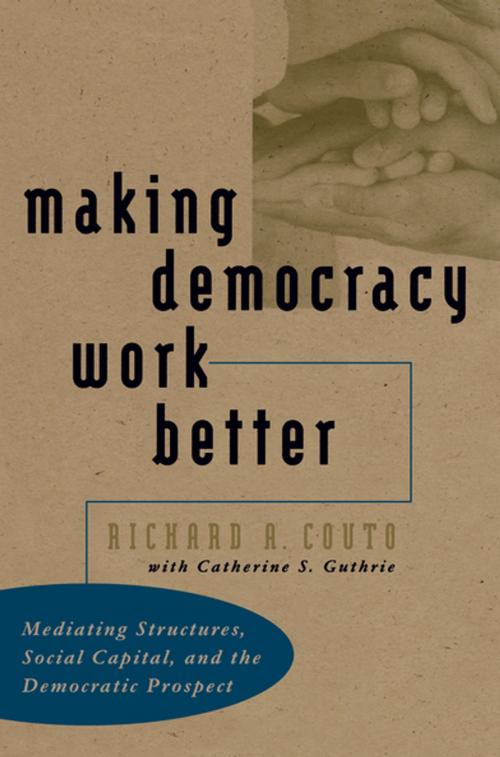Making Democracy Work Better
Mediating Structures, Social Capital, and the Democratic Prospect
Nonfiction, Social & Cultural Studies, Social Science, Sociology, Rural, Political Science, Government, Public Affairs & Administration, Politics, Social Services & Welfare| Author: | Richard A. Couto | ISBN: | 9780807861080 |
| Publisher: | The University of North Carolina Press | Publication: | July 11, 2003 |
| Imprint: | The University of North Carolina Press | Language: | English |
| Author: | Richard A. Couto |
| ISBN: | 9780807861080 |
| Publisher: | The University of North Carolina Press |
| Publication: | July 11, 2003 |
| Imprint: | The University of North Carolina Press |
| Language: | English |
The decade of the 1980s marked a triumph for market capitalism. As politicians of all stripes sought to reinvent government in the image of private enterprise, they looked to the voluntary sector for allies to assuage the human costs of reductions in public policies of social welfare. This book details the "savage side" of market capitalism in Appalachia and explains the social, political, and economic roles that mediating structures play in mitigating it. Profiling the work of twenty-three such mediating structures--community-based organizations that battled to provide social safety nets, fight environmental assaults, and upgrade the education and job skills of Appalachian residents--Richard Couto distills the practical lessons to be found in their successes and shortcomings.
Couto argues that a broader set of democratic dimensions be used in taking the measure of civil society and public policy in the twenty-first century. He shows that mediating structures promote the democratic prospect of reduced inequality and increased communal bonds when they provide and advocate for new forms and increased amounts of social capital--the public goods and moral resources that we invest in one another as members of a community.
The decade of the 1980s marked a triumph for market capitalism. As politicians of all stripes sought to reinvent government in the image of private enterprise, they looked to the voluntary sector for allies to assuage the human costs of reductions in public policies of social welfare. This book details the "savage side" of market capitalism in Appalachia and explains the social, political, and economic roles that mediating structures play in mitigating it. Profiling the work of twenty-three such mediating structures--community-based organizations that battled to provide social safety nets, fight environmental assaults, and upgrade the education and job skills of Appalachian residents--Richard Couto distills the practical lessons to be found in their successes and shortcomings.
Couto argues that a broader set of democratic dimensions be used in taking the measure of civil society and public policy in the twenty-first century. He shows that mediating structures promote the democratic prospect of reduced inequality and increased communal bonds when they provide and advocate for new forms and increased amounts of social capital--the public goods and moral resources that we invest in one another as members of a community.















